FPC002B: Ethics and Professionalism in Financial Advice Report
VerifiedAdded on 2022/08/17
|17
|5099
|16
Report
AI Summary
This report delves into the ethical considerations and professional standards within the realm of financial advice, using a case study involving a financial advisor named Jamie and her client, Nathan. The assignment explores how unconscious biases can influence ethical decision-making, particularly in the context of a pre-existing relationship between the advisor and the client. It examines compliance with the FASEA Code of Ethics, focusing on standards related to acting in good faith, maintaining professional relationships, and ensuring fairness. The report analyzes the implications of partisanship and rationalization in ethical dilemmas, such as whether to disclose information that could affect a client's eligibility for government benefits. It also discusses strategies for conducting initial client meetings, gathering necessary information, and providing appropriate advice. The report offers a comprehensive analysis of ethical challenges faced by financial advisors, providing insights into how to navigate complex situations and uphold professional standards.
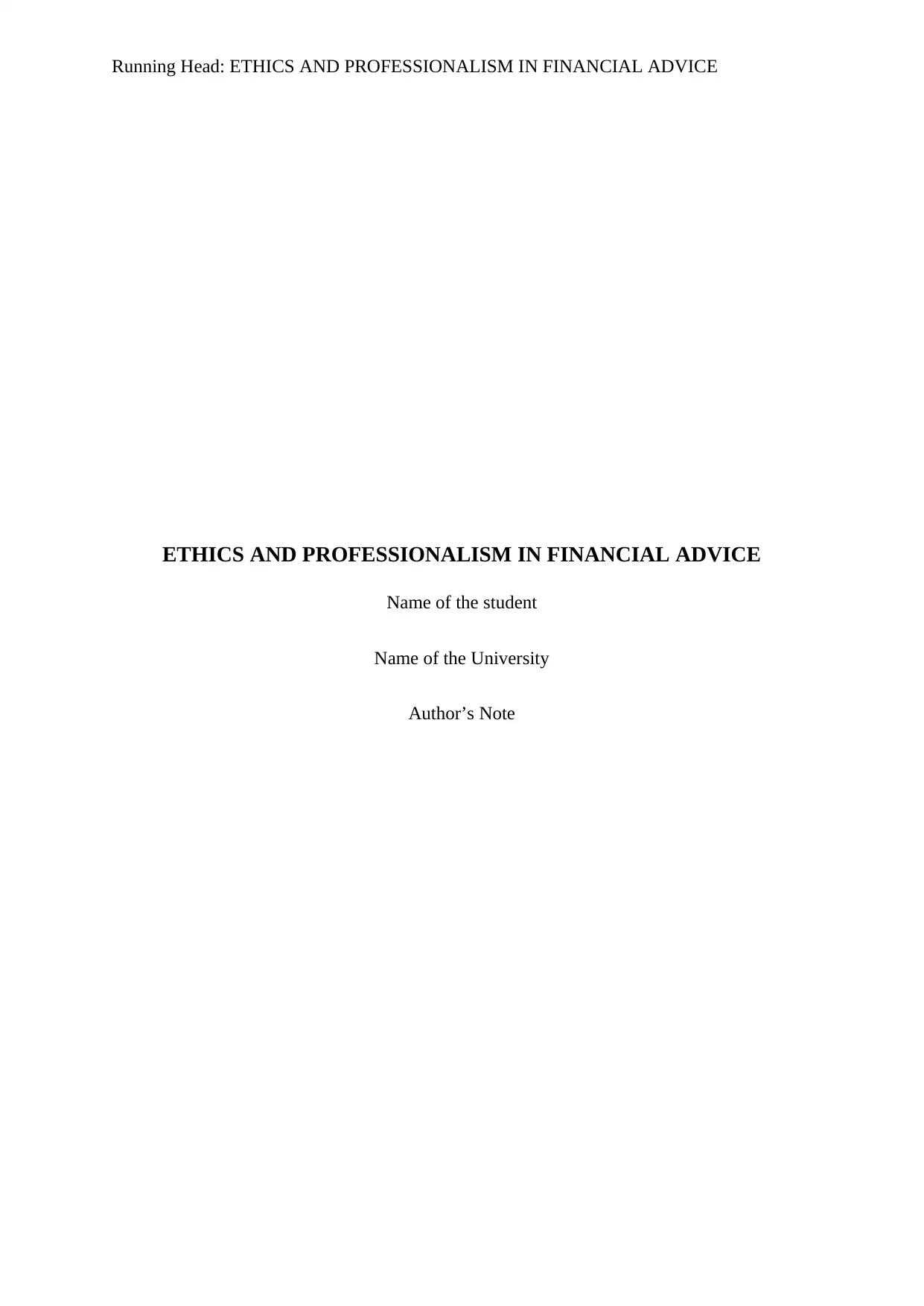
Running Head: ETHICS AND PROFESSIONALISM IN FINANCIAL ADVICE
ETHICS AND PROFESSIONALISM IN FINANCIAL ADVICE
Name of the student
Name of the University
Author’s Note
ETHICS AND PROFESSIONALISM IN FINANCIAL ADVICE
Name of the student
Name of the University
Author’s Note
Paraphrase This Document
Need a fresh take? Get an instant paraphrase of this document with our AI Paraphraser
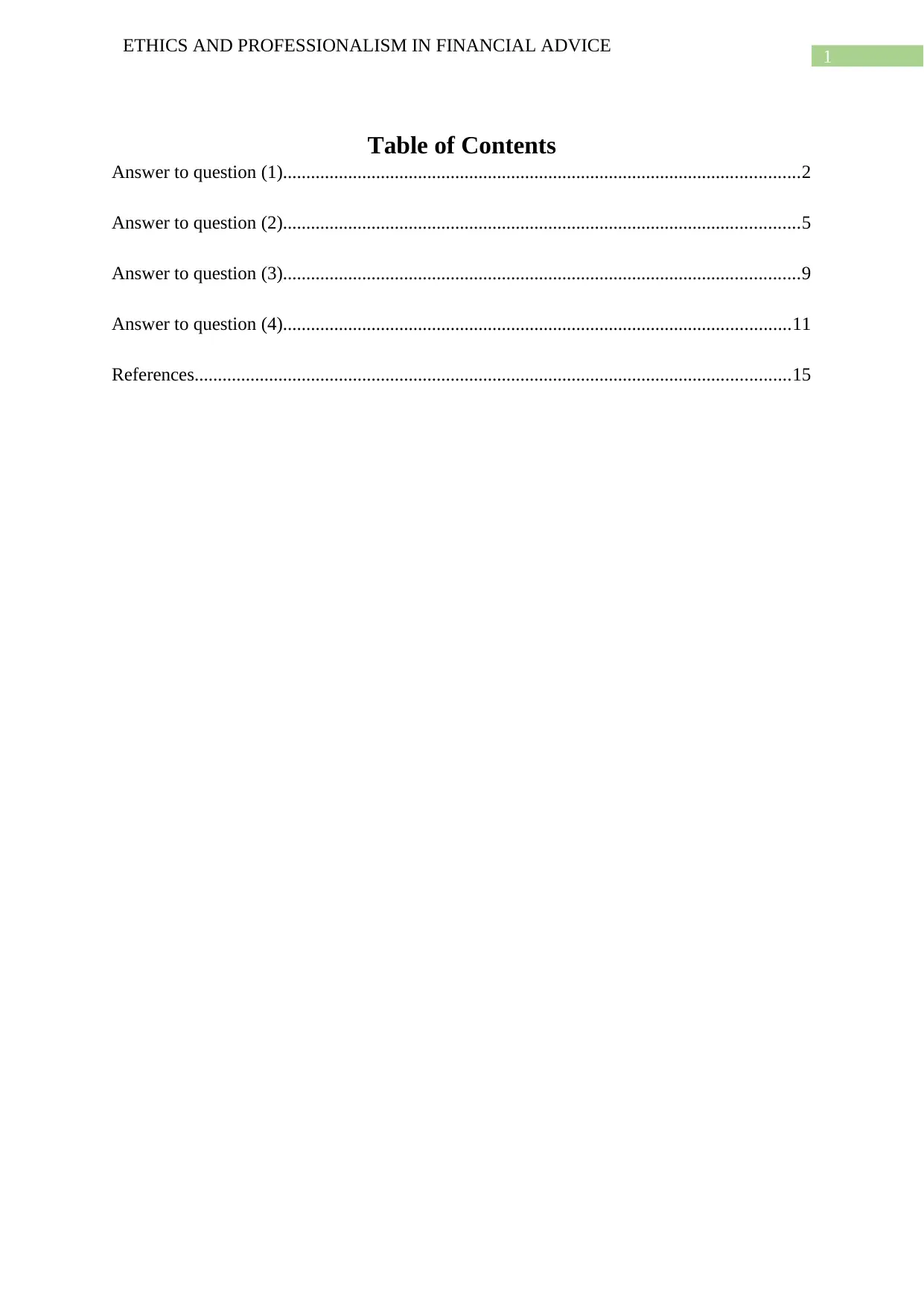
1
ETHICS AND PROFESSIONALISM IN FINANCIAL ADVICE
Table of Contents
Answer to question (1)...............................................................................................................2
Answer to question (2)...............................................................................................................5
Answer to question (3)...............................................................................................................9
Answer to question (4).............................................................................................................11
References................................................................................................................................15
ETHICS AND PROFESSIONALISM IN FINANCIAL ADVICE
Table of Contents
Answer to question (1)...............................................................................................................2
Answer to question (2)...............................................................................................................5
Answer to question (3)...............................................................................................................9
Answer to question (4).............................................................................................................11
References................................................................................................................................15
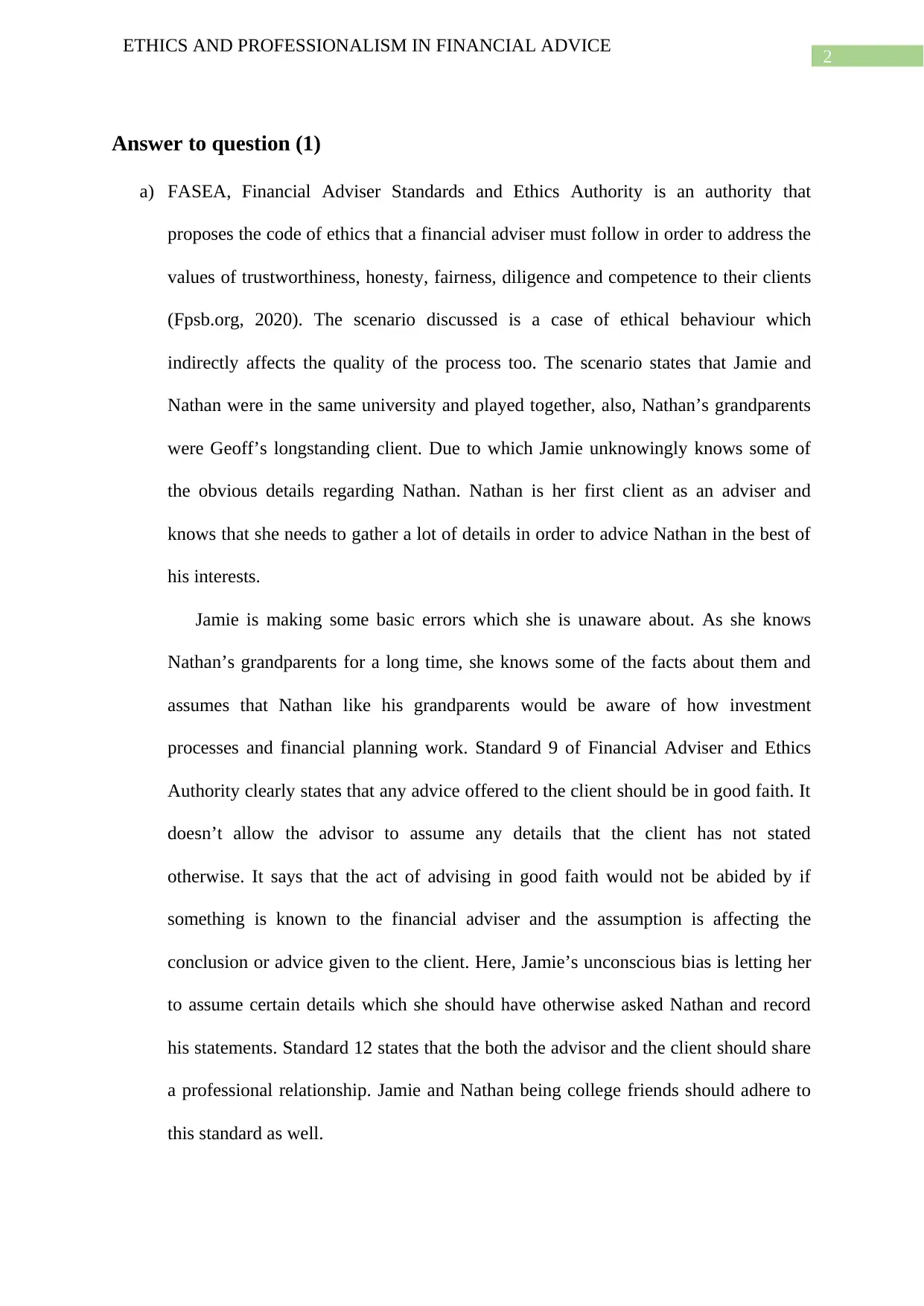
2
ETHICS AND PROFESSIONALISM IN FINANCIAL ADVICE
Answer to question (1)
a) FASEA, Financial Adviser Standards and Ethics Authority is an authority that
proposes the code of ethics that a financial adviser must follow in order to address the
values of trustworthiness, honesty, fairness, diligence and competence to their clients
(Fpsb.org, 2020). The scenario discussed is a case of ethical behaviour which
indirectly affects the quality of the process too. The scenario states that Jamie and
Nathan were in the same university and played together, also, Nathan’s grandparents
were Geoff’s longstanding client. Due to which Jamie unknowingly knows some of
the obvious details regarding Nathan. Nathan is her first client as an adviser and
knows that she needs to gather a lot of details in order to advice Nathan in the best of
his interests.
Jamie is making some basic errors which she is unaware about. As she knows
Nathan’s grandparents for a long time, she knows some of the facts about them and
assumes that Nathan like his grandparents would be aware of how investment
processes and financial planning work. Standard 9 of Financial Adviser and Ethics
Authority clearly states that any advice offered to the client should be in good faith. It
doesn’t allow the advisor to assume any details that the client has not stated
otherwise. It says that the act of advising in good faith would not be abided by if
something is known to the financial adviser and the assumption is affecting the
conclusion or advice given to the client. Here, Jamie’s unconscious bias is letting her
to assume certain details which she should have otherwise asked Nathan and record
his statements. Standard 12 states that the both the advisor and the client should share
a professional relationship. Jamie and Nathan being college friends should adhere to
this standard as well.
ETHICS AND PROFESSIONALISM IN FINANCIAL ADVICE
Answer to question (1)
a) FASEA, Financial Adviser Standards and Ethics Authority is an authority that
proposes the code of ethics that a financial adviser must follow in order to address the
values of trustworthiness, honesty, fairness, diligence and competence to their clients
(Fpsb.org, 2020). The scenario discussed is a case of ethical behaviour which
indirectly affects the quality of the process too. The scenario states that Jamie and
Nathan were in the same university and played together, also, Nathan’s grandparents
were Geoff’s longstanding client. Due to which Jamie unknowingly knows some of
the obvious details regarding Nathan. Nathan is her first client as an adviser and
knows that she needs to gather a lot of details in order to advice Nathan in the best of
his interests.
Jamie is making some basic errors which she is unaware about. As she knows
Nathan’s grandparents for a long time, she knows some of the facts about them and
assumes that Nathan like his grandparents would be aware of how investment
processes and financial planning work. Standard 9 of Financial Adviser and Ethics
Authority clearly states that any advice offered to the client should be in good faith. It
doesn’t allow the advisor to assume any details that the client has not stated
otherwise. It says that the act of advising in good faith would not be abided by if
something is known to the financial adviser and the assumption is affecting the
conclusion or advice given to the client. Here, Jamie’s unconscious bias is letting her
to assume certain details which she should have otherwise asked Nathan and record
his statements. Standard 12 states that the both the advisor and the client should share
a professional relationship. Jamie and Nathan being college friends should adhere to
this standard as well.
⊘ This is a preview!⊘
Do you want full access?
Subscribe today to unlock all pages.

Trusted by 1+ million students worldwide
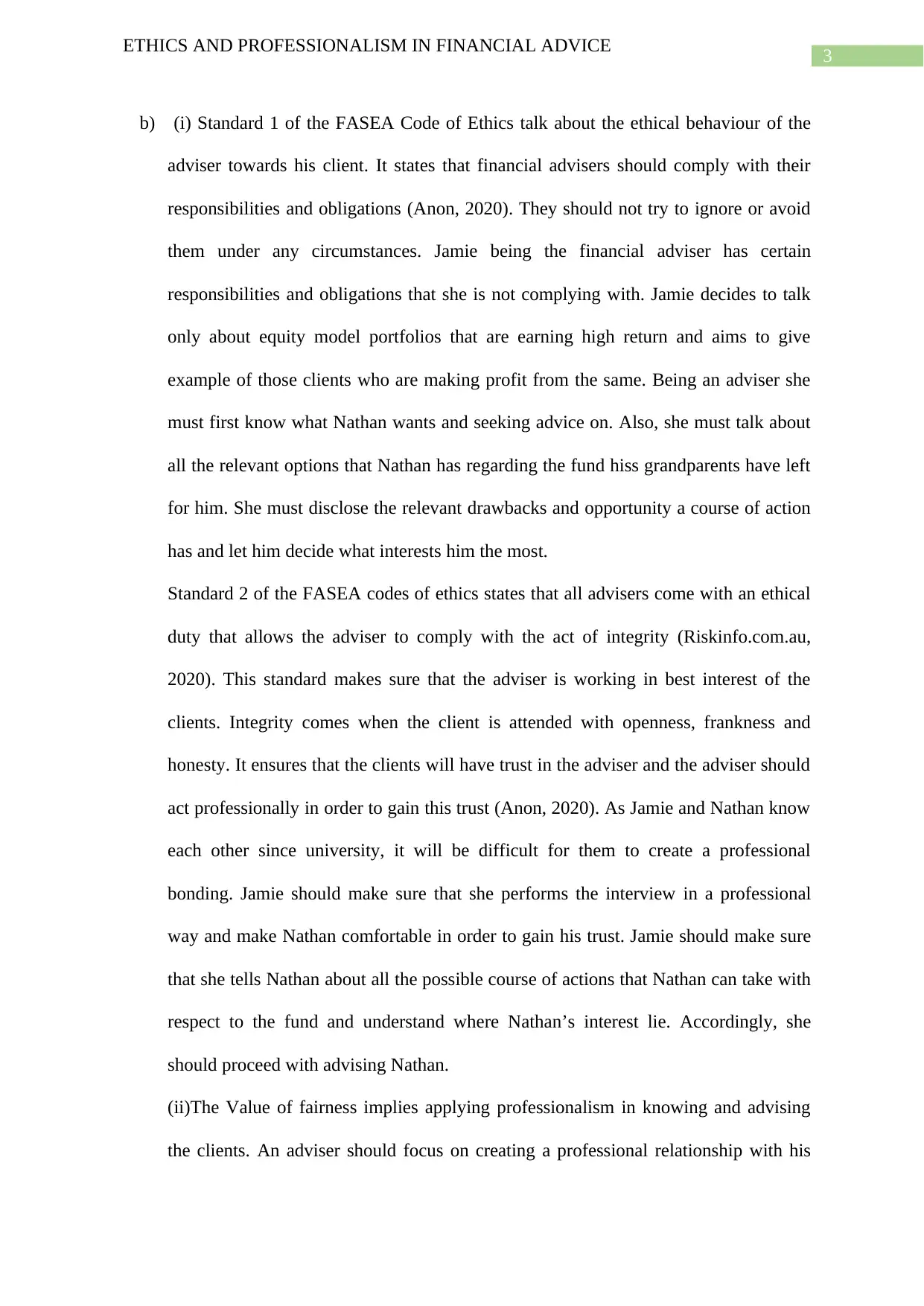
3
ETHICS AND PROFESSIONALISM IN FINANCIAL ADVICE
b) (i) Standard 1 of the FASEA Code of Ethics talk about the ethical behaviour of the
adviser towards his client. It states that financial advisers should comply with their
responsibilities and obligations (Anon, 2020). They should not try to ignore or avoid
them under any circumstances. Jamie being the financial adviser has certain
responsibilities and obligations that she is not complying with. Jamie decides to talk
only about equity model portfolios that are earning high return and aims to give
example of those clients who are making profit from the same. Being an adviser she
must first know what Nathan wants and seeking advice on. Also, she must talk about
all the relevant options that Nathan has regarding the fund hiss grandparents have left
for him. She must disclose the relevant drawbacks and opportunity a course of action
has and let him decide what interests him the most.
Standard 2 of the FASEA codes of ethics states that all advisers come with an ethical
duty that allows the adviser to comply with the act of integrity (Riskinfo.com.au,
2020). This standard makes sure that the adviser is working in best interest of the
clients. Integrity comes when the client is attended with openness, frankness and
honesty. It ensures that the clients will have trust in the adviser and the adviser should
act professionally in order to gain this trust (Anon, 2020). As Jamie and Nathan know
each other since university, it will be difficult for them to create a professional
bonding. Jamie should make sure that she performs the interview in a professional
way and make Nathan comfortable in order to gain his trust. Jamie should make sure
that she tells Nathan about all the possible course of actions that Nathan can take with
respect to the fund and understand where Nathan’s interest lie. Accordingly, she
should proceed with advising Nathan.
(ii)The Value of fairness implies applying professionalism in knowing and advising
the clients. An adviser should focus on creating a professional relationship with his
ETHICS AND PROFESSIONALISM IN FINANCIAL ADVICE
b) (i) Standard 1 of the FASEA Code of Ethics talk about the ethical behaviour of the
adviser towards his client. It states that financial advisers should comply with their
responsibilities and obligations (Anon, 2020). They should not try to ignore or avoid
them under any circumstances. Jamie being the financial adviser has certain
responsibilities and obligations that she is not complying with. Jamie decides to talk
only about equity model portfolios that are earning high return and aims to give
example of those clients who are making profit from the same. Being an adviser she
must first know what Nathan wants and seeking advice on. Also, she must talk about
all the relevant options that Nathan has regarding the fund hiss grandparents have left
for him. She must disclose the relevant drawbacks and opportunity a course of action
has and let him decide what interests him the most.
Standard 2 of the FASEA codes of ethics states that all advisers come with an ethical
duty that allows the adviser to comply with the act of integrity (Riskinfo.com.au,
2020). This standard makes sure that the adviser is working in best interest of the
clients. Integrity comes when the client is attended with openness, frankness and
honesty. It ensures that the clients will have trust in the adviser and the adviser should
act professionally in order to gain this trust (Anon, 2020). As Jamie and Nathan know
each other since university, it will be difficult for them to create a professional
bonding. Jamie should make sure that she performs the interview in a professional
way and make Nathan comfortable in order to gain his trust. Jamie should make sure
that she tells Nathan about all the possible course of actions that Nathan can take with
respect to the fund and understand where Nathan’s interest lie. Accordingly, she
should proceed with advising Nathan.
(ii)The Value of fairness implies applying professionalism in knowing and advising
the clients. An adviser should focus on creating a professional relationship with his
Paraphrase This Document
Need a fresh take? Get an instant paraphrase of this document with our AI Paraphraser
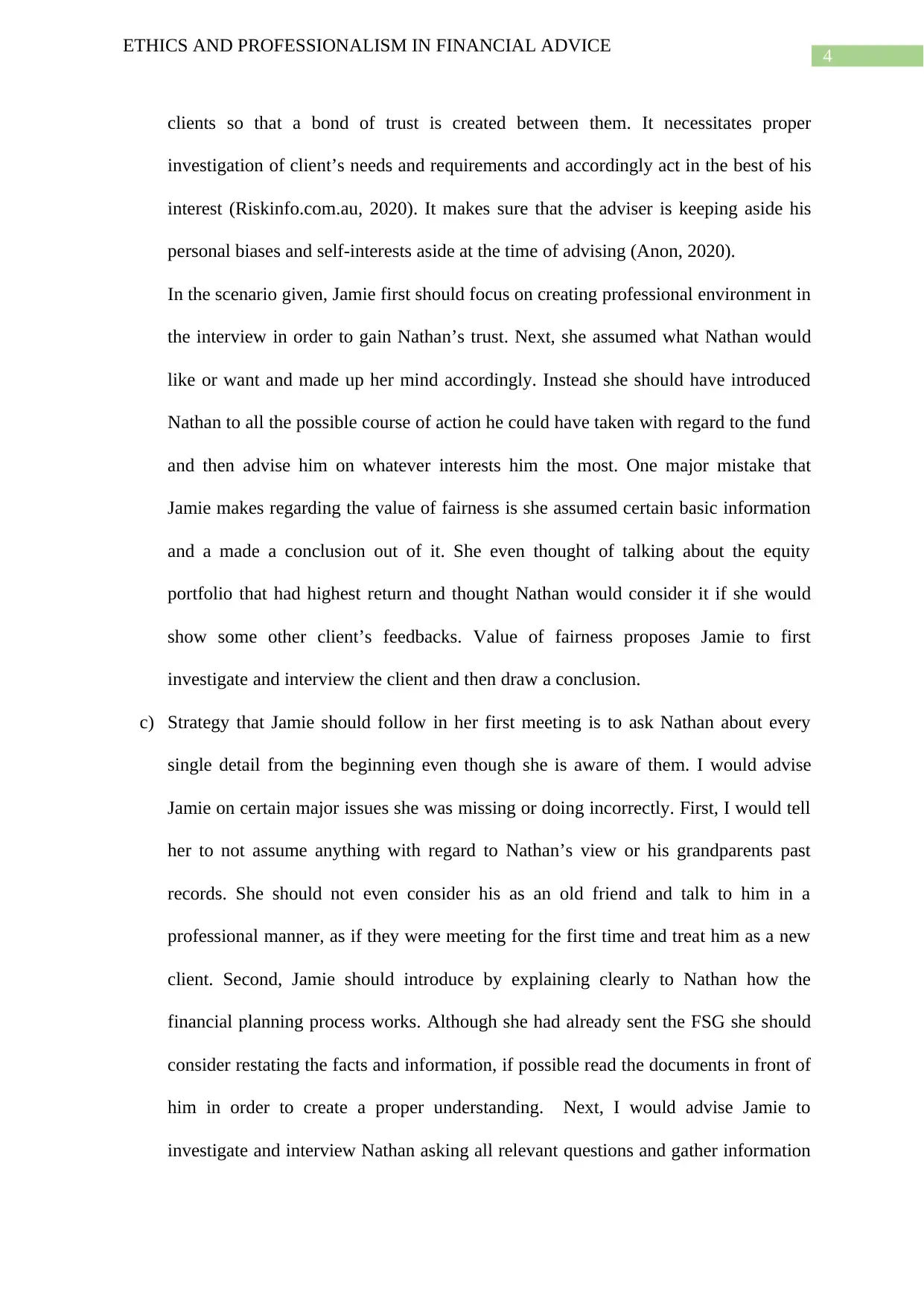
4
ETHICS AND PROFESSIONALISM IN FINANCIAL ADVICE
clients so that a bond of trust is created between them. It necessitates proper
investigation of client’s needs and requirements and accordingly act in the best of his
interest (Riskinfo.com.au, 2020). It makes sure that the adviser is keeping aside his
personal biases and self-interests aside at the time of advising (Anon, 2020).
In the scenario given, Jamie first should focus on creating professional environment in
the interview in order to gain Nathan’s trust. Next, she assumed what Nathan would
like or want and made up her mind accordingly. Instead she should have introduced
Nathan to all the possible course of action he could have taken with regard to the fund
and then advise him on whatever interests him the most. One major mistake that
Jamie makes regarding the value of fairness is she assumed certain basic information
and a made a conclusion out of it. She even thought of talking about the equity
portfolio that had highest return and thought Nathan would consider it if she would
show some other client’s feedbacks. Value of fairness proposes Jamie to first
investigate and interview the client and then draw a conclusion.
c) Strategy that Jamie should follow in her first meeting is to ask Nathan about every
single detail from the beginning even though she is aware of them. I would advise
Jamie on certain major issues she was missing or doing incorrectly. First, I would tell
her to not assume anything with regard to Nathan’s view or his grandparents past
records. She should not even consider his as an old friend and talk to him in a
professional manner, as if they were meeting for the first time and treat him as a new
client. Second, Jamie should introduce by explaining clearly to Nathan how the
financial planning process works. Although she had already sent the FSG she should
consider restating the facts and information, if possible read the documents in front of
him in order to create a proper understanding. Next, I would advise Jamie to
investigate and interview Nathan asking all relevant questions and gather information
ETHICS AND PROFESSIONALISM IN FINANCIAL ADVICE
clients so that a bond of trust is created between them. It necessitates proper
investigation of client’s needs and requirements and accordingly act in the best of his
interest (Riskinfo.com.au, 2020). It makes sure that the adviser is keeping aside his
personal biases and self-interests aside at the time of advising (Anon, 2020).
In the scenario given, Jamie first should focus on creating professional environment in
the interview in order to gain Nathan’s trust. Next, she assumed what Nathan would
like or want and made up her mind accordingly. Instead she should have introduced
Nathan to all the possible course of action he could have taken with regard to the fund
and then advise him on whatever interests him the most. One major mistake that
Jamie makes regarding the value of fairness is she assumed certain basic information
and a made a conclusion out of it. She even thought of talking about the equity
portfolio that had highest return and thought Nathan would consider it if she would
show some other client’s feedbacks. Value of fairness proposes Jamie to first
investigate and interview the client and then draw a conclusion.
c) Strategy that Jamie should follow in her first meeting is to ask Nathan about every
single detail from the beginning even though she is aware of them. I would advise
Jamie on certain major issues she was missing or doing incorrectly. First, I would tell
her to not assume anything with regard to Nathan’s view or his grandparents past
records. She should not even consider his as an old friend and talk to him in a
professional manner, as if they were meeting for the first time and treat him as a new
client. Second, Jamie should introduce by explaining clearly to Nathan how the
financial planning process works. Although she had already sent the FSG she should
consider restating the facts and information, if possible read the documents in front of
him in order to create a proper understanding. Next, I would advise Jamie to
investigate and interview Nathan asking all relevant questions and gather information
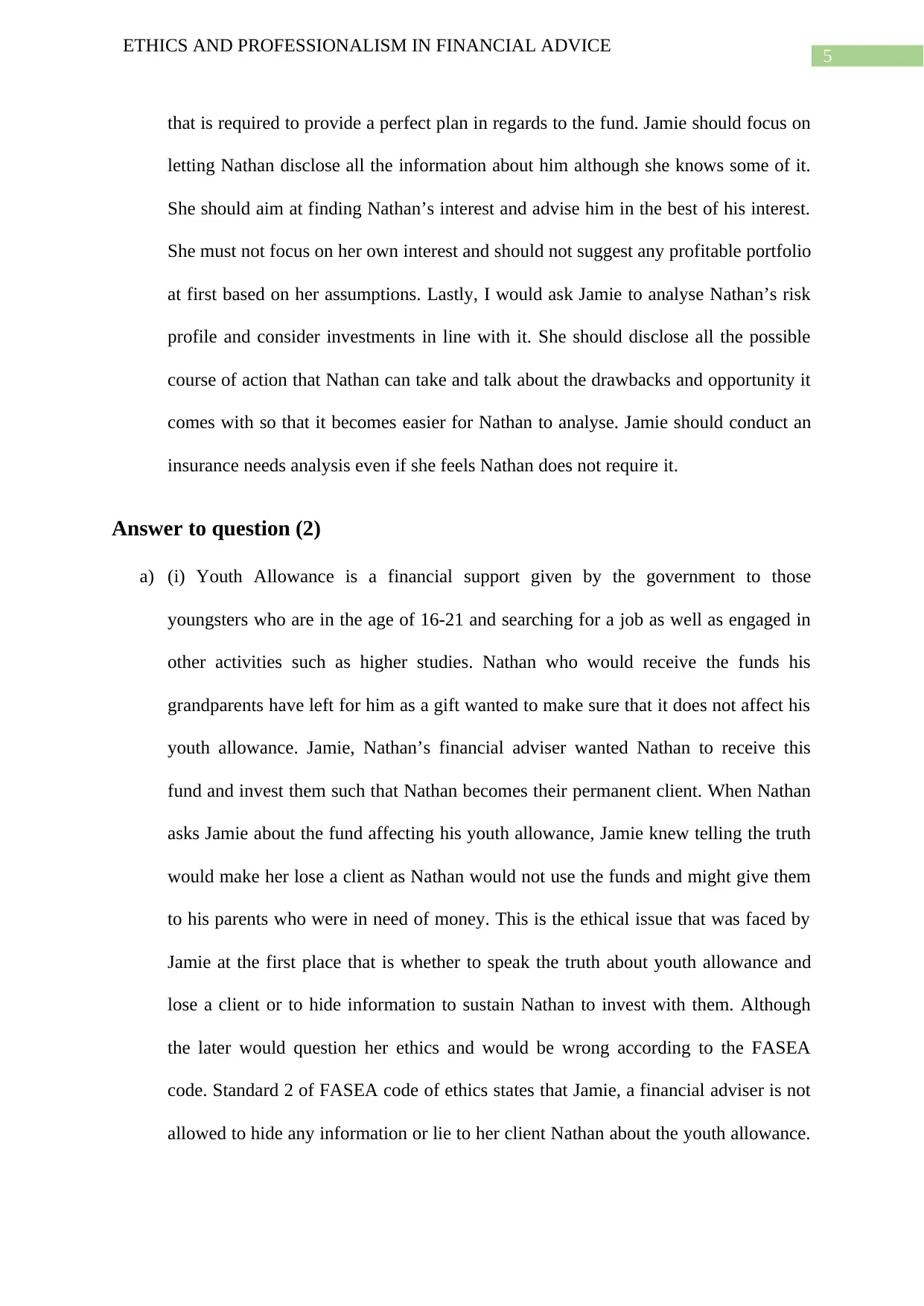
5
ETHICS AND PROFESSIONALISM IN FINANCIAL ADVICE
that is required to provide a perfect plan in regards to the fund. Jamie should focus on
letting Nathan disclose all the information about him although she knows some of it.
She should aim at finding Nathan’s interest and advise him in the best of his interest.
She must not focus on her own interest and should not suggest any profitable portfolio
at first based on her assumptions. Lastly, I would ask Jamie to analyse Nathan’s risk
profile and consider investments in line with it. She should disclose all the possible
course of action that Nathan can take and talk about the drawbacks and opportunity it
comes with so that it becomes easier for Nathan to analyse. Jamie should conduct an
insurance needs analysis even if she feels Nathan does not require it.
Answer to question (2)
a) (i) Youth Allowance is a financial support given by the government to those
youngsters who are in the age of 16-21 and searching for a job as well as engaged in
other activities such as higher studies. Nathan who would receive the funds his
grandparents have left for him as a gift wanted to make sure that it does not affect his
youth allowance. Jamie, Nathan’s financial adviser wanted Nathan to receive this
fund and invest them such that Nathan becomes their permanent client. When Nathan
asks Jamie about the fund affecting his youth allowance, Jamie knew telling the truth
would make her lose a client as Nathan would not use the funds and might give them
to his parents who were in need of money. This is the ethical issue that was faced by
Jamie at the first place that is whether to speak the truth about youth allowance and
lose a client or to hide information to sustain Nathan to invest with them. Although
the later would question her ethics and would be wrong according to the FASEA
code. Standard 2 of FASEA code of ethics states that Jamie, a financial adviser is not
allowed to hide any information or lie to her client Nathan about the youth allowance.
ETHICS AND PROFESSIONALISM IN FINANCIAL ADVICE
that is required to provide a perfect plan in regards to the fund. Jamie should focus on
letting Nathan disclose all the information about him although she knows some of it.
She should aim at finding Nathan’s interest and advise him in the best of his interest.
She must not focus on her own interest and should not suggest any profitable portfolio
at first based on her assumptions. Lastly, I would ask Jamie to analyse Nathan’s risk
profile and consider investments in line with it. She should disclose all the possible
course of action that Nathan can take and talk about the drawbacks and opportunity it
comes with so that it becomes easier for Nathan to analyse. Jamie should conduct an
insurance needs analysis even if she feels Nathan does not require it.
Answer to question (2)
a) (i) Youth Allowance is a financial support given by the government to those
youngsters who are in the age of 16-21 and searching for a job as well as engaged in
other activities such as higher studies. Nathan who would receive the funds his
grandparents have left for him as a gift wanted to make sure that it does not affect his
youth allowance. Jamie, Nathan’s financial adviser wanted Nathan to receive this
fund and invest them such that Nathan becomes their permanent client. When Nathan
asks Jamie about the fund affecting his youth allowance, Jamie knew telling the truth
would make her lose a client as Nathan would not use the funds and might give them
to his parents who were in need of money. This is the ethical issue that was faced by
Jamie at the first place that is whether to speak the truth about youth allowance and
lose a client or to hide information to sustain Nathan to invest with them. Although
the later would question her ethics and would be wrong according to the FASEA
code. Standard 2 of FASEA code of ethics states that Jamie, a financial adviser is not
allowed to hide any information or lie to her client Nathan about the youth allowance.
⊘ This is a preview!⊘
Do you want full access?
Subscribe today to unlock all pages.

Trusted by 1+ million students worldwide
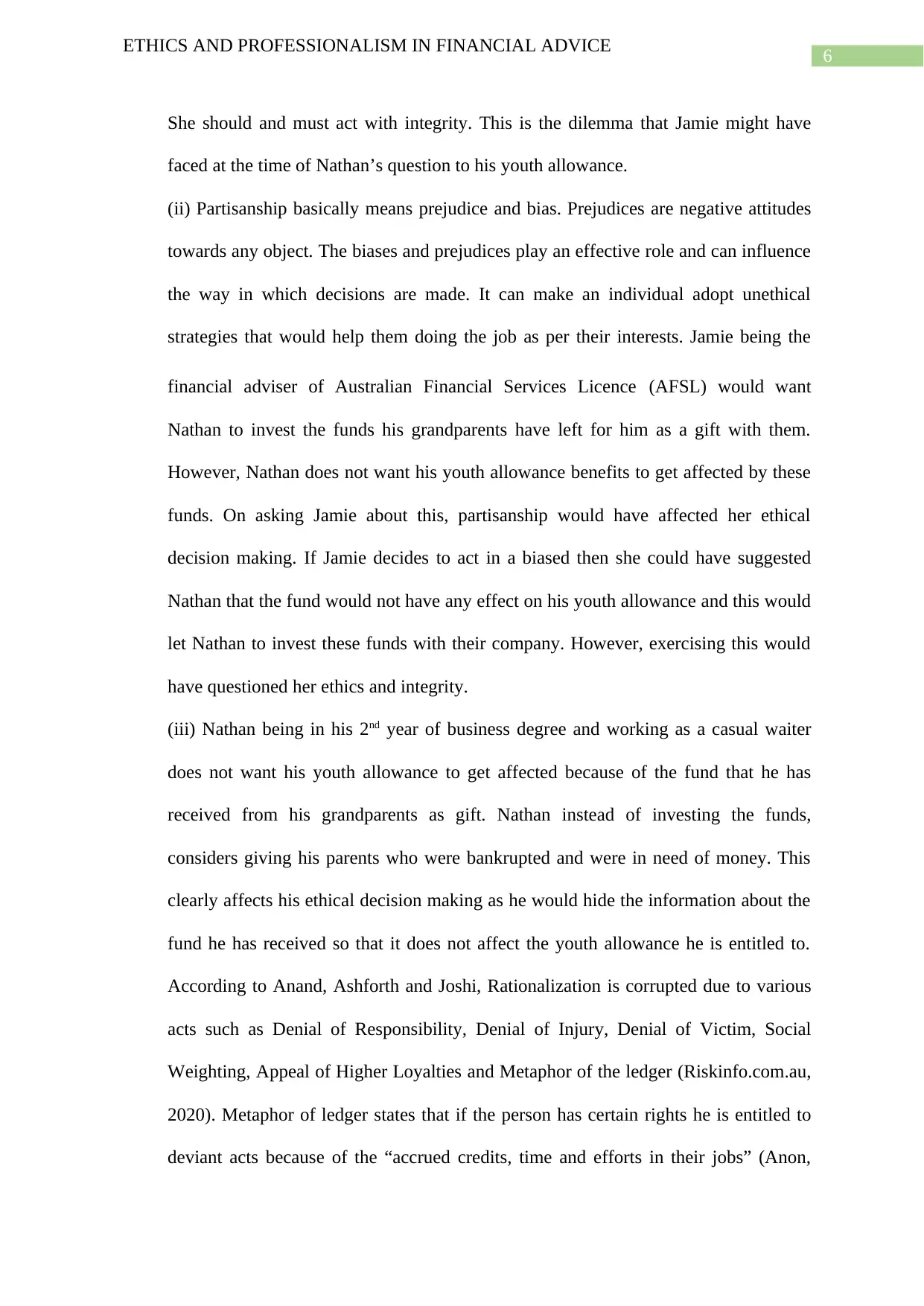
6
ETHICS AND PROFESSIONALISM IN FINANCIAL ADVICE
She should and must act with integrity. This is the dilemma that Jamie might have
faced at the time of Nathan’s question to his youth allowance.
(ii) Partisanship basically means prejudice and bias. Prejudices are negative attitudes
towards any object. The biases and prejudices play an effective role and can influence
the way in which decisions are made. It can make an individual adopt unethical
strategies that would help them doing the job as per their interests. Jamie being the
financial adviser of Australian Financial Services Licence (AFSL) would want
Nathan to invest the funds his grandparents have left for him as a gift with them.
However, Nathan does not want his youth allowance benefits to get affected by these
funds. On asking Jamie about this, partisanship would have affected her ethical
decision making. If Jamie decides to act in a biased then she could have suggested
Nathan that the fund would not have any effect on his youth allowance and this would
let Nathan to invest these funds with their company. However, exercising this would
have questioned her ethics and integrity.
(iii) Nathan being in his 2nd year of business degree and working as a casual waiter
does not want his youth allowance to get affected because of the fund that he has
received from his grandparents as gift. Nathan instead of investing the funds,
considers giving his parents who were bankrupted and were in need of money. This
clearly affects his ethical decision making as he would hide the information about the
fund he has received so that it does not affect the youth allowance he is entitled to.
According to Anand, Ashforth and Joshi, Rationalization is corrupted due to various
acts such as Denial of Responsibility, Denial of Injury, Denial of Victim, Social
Weighting, Appeal of Higher Loyalties and Metaphor of the ledger (Riskinfo.com.au,
2020). Metaphor of ledger states that if the person has certain rights he is entitled to
deviant acts because of the “accrued credits, time and efforts in their jobs” (Anon,
ETHICS AND PROFESSIONALISM IN FINANCIAL ADVICE
She should and must act with integrity. This is the dilemma that Jamie might have
faced at the time of Nathan’s question to his youth allowance.
(ii) Partisanship basically means prejudice and bias. Prejudices are negative attitudes
towards any object. The biases and prejudices play an effective role and can influence
the way in which decisions are made. It can make an individual adopt unethical
strategies that would help them doing the job as per their interests. Jamie being the
financial adviser of Australian Financial Services Licence (AFSL) would want
Nathan to invest the funds his grandparents have left for him as a gift with them.
However, Nathan does not want his youth allowance benefits to get affected by these
funds. On asking Jamie about this, partisanship would have affected her ethical
decision making. If Jamie decides to act in a biased then she could have suggested
Nathan that the fund would not have any effect on his youth allowance and this would
let Nathan to invest these funds with their company. However, exercising this would
have questioned her ethics and integrity.
(iii) Nathan being in his 2nd year of business degree and working as a casual waiter
does not want his youth allowance to get affected because of the fund that he has
received from his grandparents as gift. Nathan instead of investing the funds,
considers giving his parents who were bankrupted and were in need of money. This
clearly affects his ethical decision making as he would hide the information about the
fund he has received so that it does not affect the youth allowance he is entitled to.
According to Anand, Ashforth and Joshi, Rationalization is corrupted due to various
acts such as Denial of Responsibility, Denial of Injury, Denial of Victim, Social
Weighting, Appeal of Higher Loyalties and Metaphor of the ledger (Riskinfo.com.au,
2020). Metaphor of ledger states that if the person has certain rights he is entitled to
deviant acts because of the “accrued credits, time and efforts in their jobs” (Anon,
Paraphrase This Document
Need a fresh take? Get an instant paraphrase of this document with our AI Paraphraser
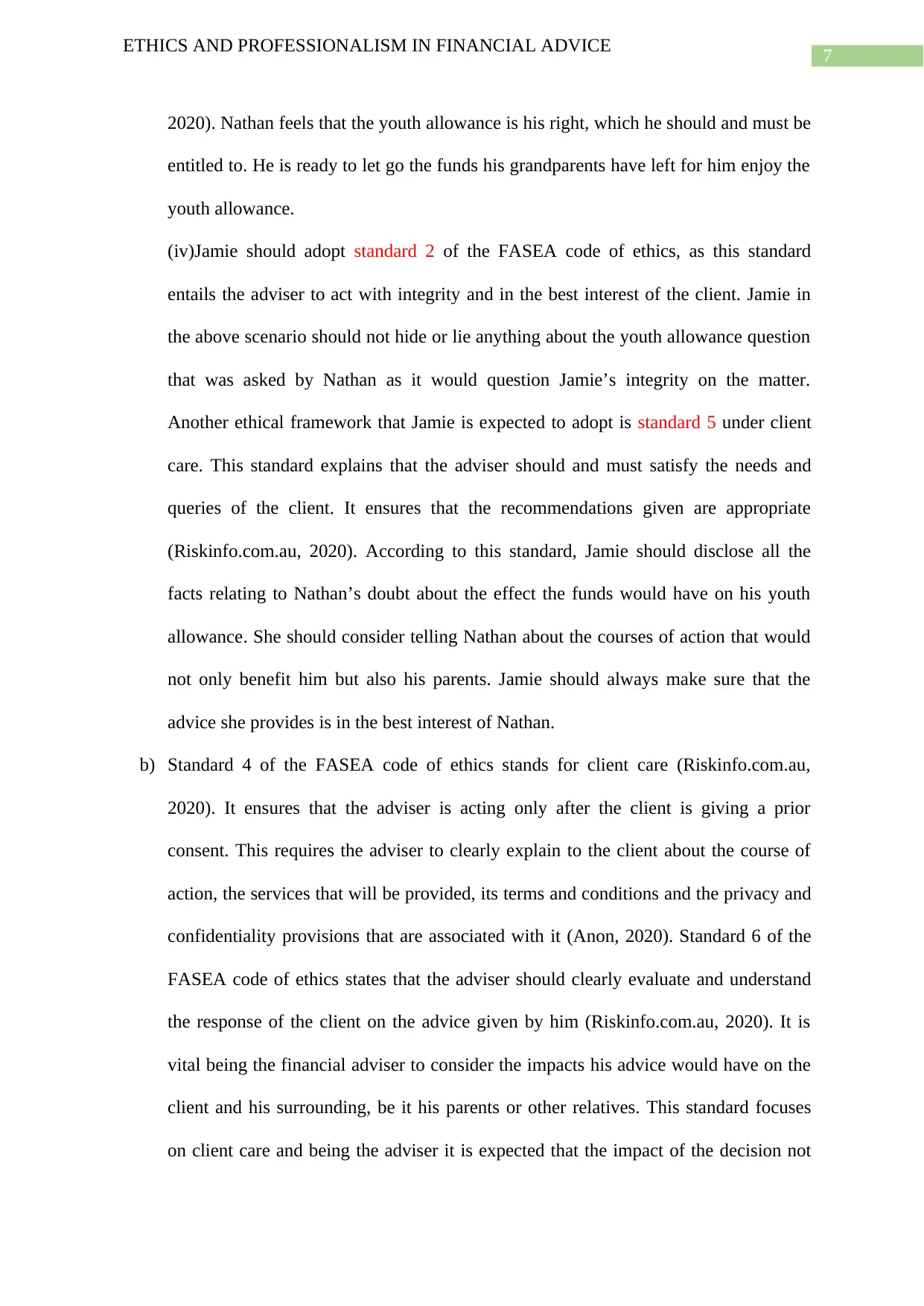
7
ETHICS AND PROFESSIONALISM IN FINANCIAL ADVICE
2020). Nathan feels that the youth allowance is his right, which he should and must be
entitled to. He is ready to let go the funds his grandparents have left for him enjoy the
youth allowance.
(iv)Jamie should adopt standard 2 of the FASEA code of ethics, as this standard
entails the adviser to act with integrity and in the best interest of the client. Jamie in
the above scenario should not hide or lie anything about the youth allowance question
that was asked by Nathan as it would question Jamie’s integrity on the matter.
Another ethical framework that Jamie is expected to adopt is standard 5 under client
care. This standard explains that the adviser should and must satisfy the needs and
queries of the client. It ensures that the recommendations given are appropriate
(Riskinfo.com.au, 2020). According to this standard, Jamie should disclose all the
facts relating to Nathan’s doubt about the effect the funds would have on his youth
allowance. She should consider telling Nathan about the courses of action that would
not only benefit him but also his parents. Jamie should always make sure that the
advice she provides is in the best interest of Nathan.
b) Standard 4 of the FASEA code of ethics stands for client care (Riskinfo.com.au,
2020). It ensures that the adviser is acting only after the client is giving a prior
consent. This requires the adviser to clearly explain to the client about the course of
action, the services that will be provided, its terms and conditions and the privacy and
confidentiality provisions that are associated with it (Anon, 2020). Standard 6 of the
FASEA code of ethics states that the adviser should clearly evaluate and understand
the response of the client on the advice given by him (Riskinfo.com.au, 2020). It is
vital being the financial adviser to consider the impacts his advice would have on the
client and his surrounding, be it his parents or other relatives. This standard focuses
on client care and being the adviser it is expected that the impact of the decision not
ETHICS AND PROFESSIONALISM IN FINANCIAL ADVICE
2020). Nathan feels that the youth allowance is his right, which he should and must be
entitled to. He is ready to let go the funds his grandparents have left for him enjoy the
youth allowance.
(iv)Jamie should adopt standard 2 of the FASEA code of ethics, as this standard
entails the adviser to act with integrity and in the best interest of the client. Jamie in
the above scenario should not hide or lie anything about the youth allowance question
that was asked by Nathan as it would question Jamie’s integrity on the matter.
Another ethical framework that Jamie is expected to adopt is standard 5 under client
care. This standard explains that the adviser should and must satisfy the needs and
queries of the client. It ensures that the recommendations given are appropriate
(Riskinfo.com.au, 2020). According to this standard, Jamie should disclose all the
facts relating to Nathan’s doubt about the effect the funds would have on his youth
allowance. She should consider telling Nathan about the courses of action that would
not only benefit him but also his parents. Jamie should always make sure that the
advice she provides is in the best interest of Nathan.
b) Standard 4 of the FASEA code of ethics stands for client care (Riskinfo.com.au,
2020). It ensures that the adviser is acting only after the client is giving a prior
consent. This requires the adviser to clearly explain to the client about the course of
action, the services that will be provided, its terms and conditions and the privacy and
confidentiality provisions that are associated with it (Anon, 2020). Standard 6 of the
FASEA code of ethics states that the adviser should clearly evaluate and understand
the response of the client on the advice given by him (Riskinfo.com.au, 2020). It is
vital being the financial adviser to consider the impacts his advice would have on the
client and his surrounding, be it his parents or other relatives. This standard focuses
on client care and being the adviser it is expected that the impact of the decision not
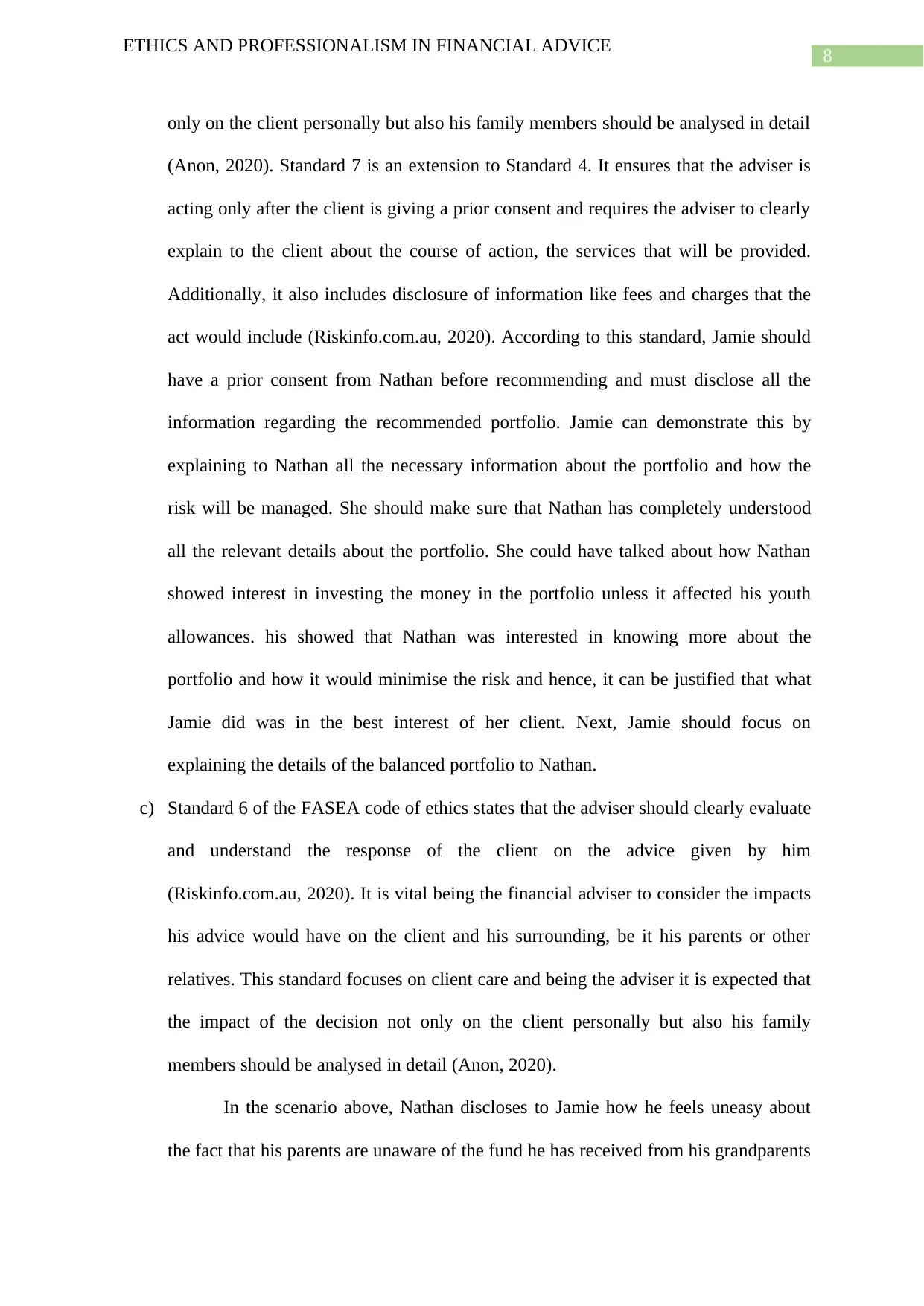
8
ETHICS AND PROFESSIONALISM IN FINANCIAL ADVICE
only on the client personally but also his family members should be analysed in detail
(Anon, 2020). Standard 7 is an extension to Standard 4. It ensures that the adviser is
acting only after the client is giving a prior consent and requires the adviser to clearly
explain to the client about the course of action, the services that will be provided.
Additionally, it also includes disclosure of information like fees and charges that the
act would include (Riskinfo.com.au, 2020). According to this standard, Jamie should
have a prior consent from Nathan before recommending and must disclose all the
information regarding the recommended portfolio. Jamie can demonstrate this by
explaining to Nathan all the necessary information about the portfolio and how the
risk will be managed. She should make sure that Nathan has completely understood
all the relevant details about the portfolio. She could have talked about how Nathan
showed interest in investing the money in the portfolio unless it affected his youth
allowances. his showed that Nathan was interested in knowing more about the
portfolio and how it would minimise the risk and hence, it can be justified that what
Jamie did was in the best interest of her client. Next, Jamie should focus on
explaining the details of the balanced portfolio to Nathan.
c) Standard 6 of the FASEA code of ethics states that the adviser should clearly evaluate
and understand the response of the client on the advice given by him
(Riskinfo.com.au, 2020). It is vital being the financial adviser to consider the impacts
his advice would have on the client and his surrounding, be it his parents or other
relatives. This standard focuses on client care and being the adviser it is expected that
the impact of the decision not only on the client personally but also his family
members should be analysed in detail (Anon, 2020).
In the scenario above, Nathan discloses to Jamie how he feels uneasy about
the fact that his parents are unaware of the fund he has received from his grandparents
ETHICS AND PROFESSIONALISM IN FINANCIAL ADVICE
only on the client personally but also his family members should be analysed in detail
(Anon, 2020). Standard 7 is an extension to Standard 4. It ensures that the adviser is
acting only after the client is giving a prior consent and requires the adviser to clearly
explain to the client about the course of action, the services that will be provided.
Additionally, it also includes disclosure of information like fees and charges that the
act would include (Riskinfo.com.au, 2020). According to this standard, Jamie should
have a prior consent from Nathan before recommending and must disclose all the
information regarding the recommended portfolio. Jamie can demonstrate this by
explaining to Nathan all the necessary information about the portfolio and how the
risk will be managed. She should make sure that Nathan has completely understood
all the relevant details about the portfolio. She could have talked about how Nathan
showed interest in investing the money in the portfolio unless it affected his youth
allowances. his showed that Nathan was interested in knowing more about the
portfolio and how it would minimise the risk and hence, it can be justified that what
Jamie did was in the best interest of her client. Next, Jamie should focus on
explaining the details of the balanced portfolio to Nathan.
c) Standard 6 of the FASEA code of ethics states that the adviser should clearly evaluate
and understand the response of the client on the advice given by him
(Riskinfo.com.au, 2020). It is vital being the financial adviser to consider the impacts
his advice would have on the client and his surrounding, be it his parents or other
relatives. This standard focuses on client care and being the adviser it is expected that
the impact of the decision not only on the client personally but also his family
members should be analysed in detail (Anon, 2020).
In the scenario above, Nathan discloses to Jamie how he feels uneasy about
the fact that his parents are unaware of the fund he has received from his grandparents
⊘ This is a preview!⊘
Do you want full access?
Subscribe today to unlock all pages.

Trusted by 1+ million students worldwide
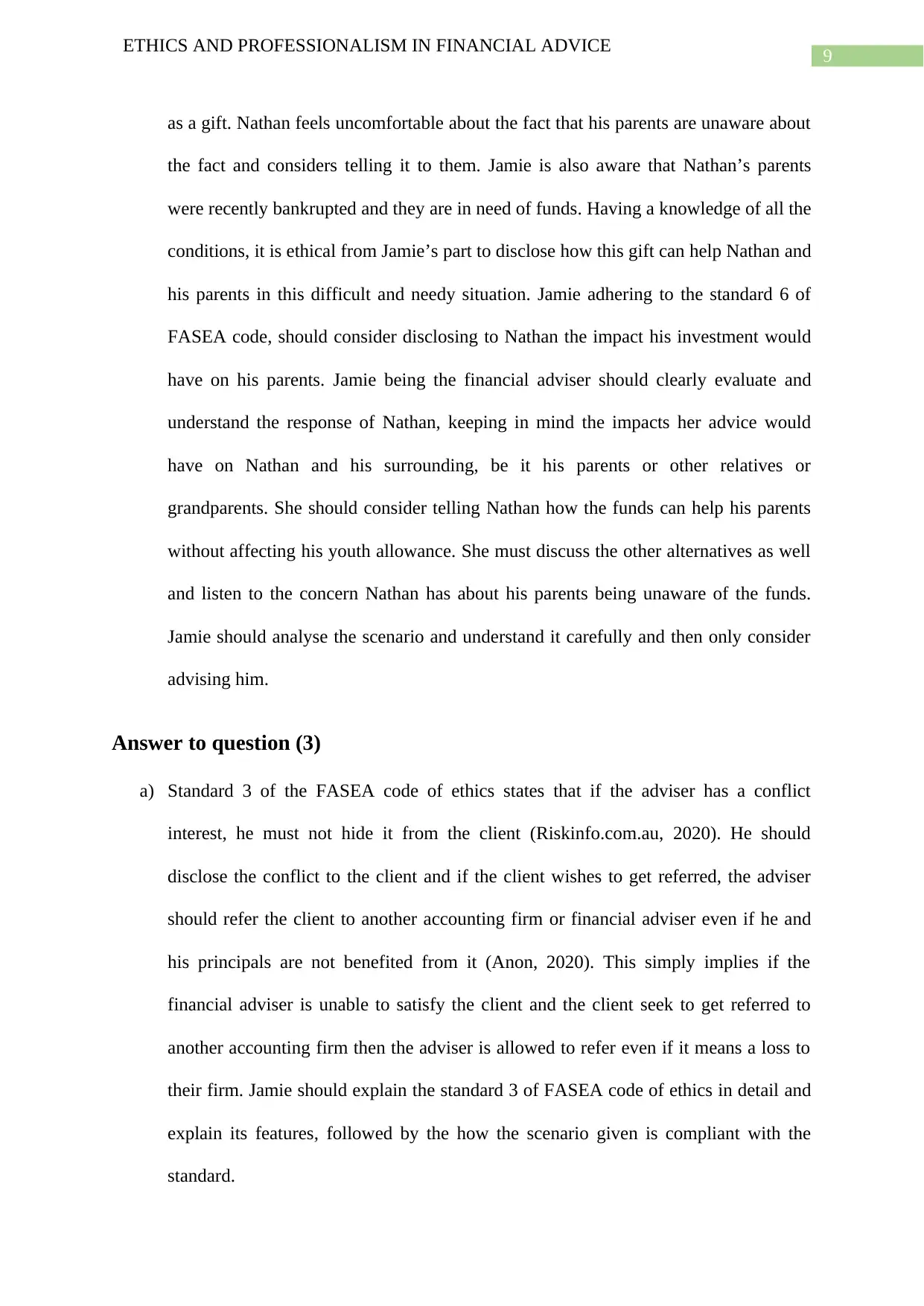
9
ETHICS AND PROFESSIONALISM IN FINANCIAL ADVICE
as a gift. Nathan feels uncomfortable about the fact that his parents are unaware about
the fact and considers telling it to them. Jamie is also aware that Nathan’s parents
were recently bankrupted and they are in need of funds. Having a knowledge of all the
conditions, it is ethical from Jamie’s part to disclose how this gift can help Nathan and
his parents in this difficult and needy situation. Jamie adhering to the standard 6 of
FASEA code, should consider disclosing to Nathan the impact his investment would
have on his parents. Jamie being the financial adviser should clearly evaluate and
understand the response of Nathan, keeping in mind the impacts her advice would
have on Nathan and his surrounding, be it his parents or other relatives or
grandparents. She should consider telling Nathan how the funds can help his parents
without affecting his youth allowance. She must discuss the other alternatives as well
and listen to the concern Nathan has about his parents being unaware of the funds.
Jamie should analyse the scenario and understand it carefully and then only consider
advising him.
Answer to question (3)
a) Standard 3 of the FASEA code of ethics states that if the adviser has a conflict
interest, he must not hide it from the client (Riskinfo.com.au, 2020). He should
disclose the conflict to the client and if the client wishes to get referred, the adviser
should refer the client to another accounting firm or financial adviser even if he and
his principals are not benefited from it (Anon, 2020). This simply implies if the
financial adviser is unable to satisfy the client and the client seek to get referred to
another accounting firm then the adviser is allowed to refer even if it means a loss to
their firm. Jamie should explain the standard 3 of FASEA code of ethics in detail and
explain its features, followed by the how the scenario given is compliant with the
standard.
ETHICS AND PROFESSIONALISM IN FINANCIAL ADVICE
as a gift. Nathan feels uncomfortable about the fact that his parents are unaware about
the fact and considers telling it to them. Jamie is also aware that Nathan’s parents
were recently bankrupted and they are in need of funds. Having a knowledge of all the
conditions, it is ethical from Jamie’s part to disclose how this gift can help Nathan and
his parents in this difficult and needy situation. Jamie adhering to the standard 6 of
FASEA code, should consider disclosing to Nathan the impact his investment would
have on his parents. Jamie being the financial adviser should clearly evaluate and
understand the response of Nathan, keeping in mind the impacts her advice would
have on Nathan and his surrounding, be it his parents or other relatives or
grandparents. She should consider telling Nathan how the funds can help his parents
without affecting his youth allowance. She must discuss the other alternatives as well
and listen to the concern Nathan has about his parents being unaware of the funds.
Jamie should analyse the scenario and understand it carefully and then only consider
advising him.
Answer to question (3)
a) Standard 3 of the FASEA code of ethics states that if the adviser has a conflict
interest, he must not hide it from the client (Riskinfo.com.au, 2020). He should
disclose the conflict to the client and if the client wishes to get referred, the adviser
should refer the client to another accounting firm or financial adviser even if he and
his principals are not benefited from it (Anon, 2020). This simply implies if the
financial adviser is unable to satisfy the client and the client seek to get referred to
another accounting firm then the adviser is allowed to refer even if it means a loss to
their firm. Jamie should explain the standard 3 of FASEA code of ethics in detail and
explain its features, followed by the how the scenario given is compliant with the
standard.
Paraphrase This Document
Need a fresh take? Get an instant paraphrase of this document with our AI Paraphraser
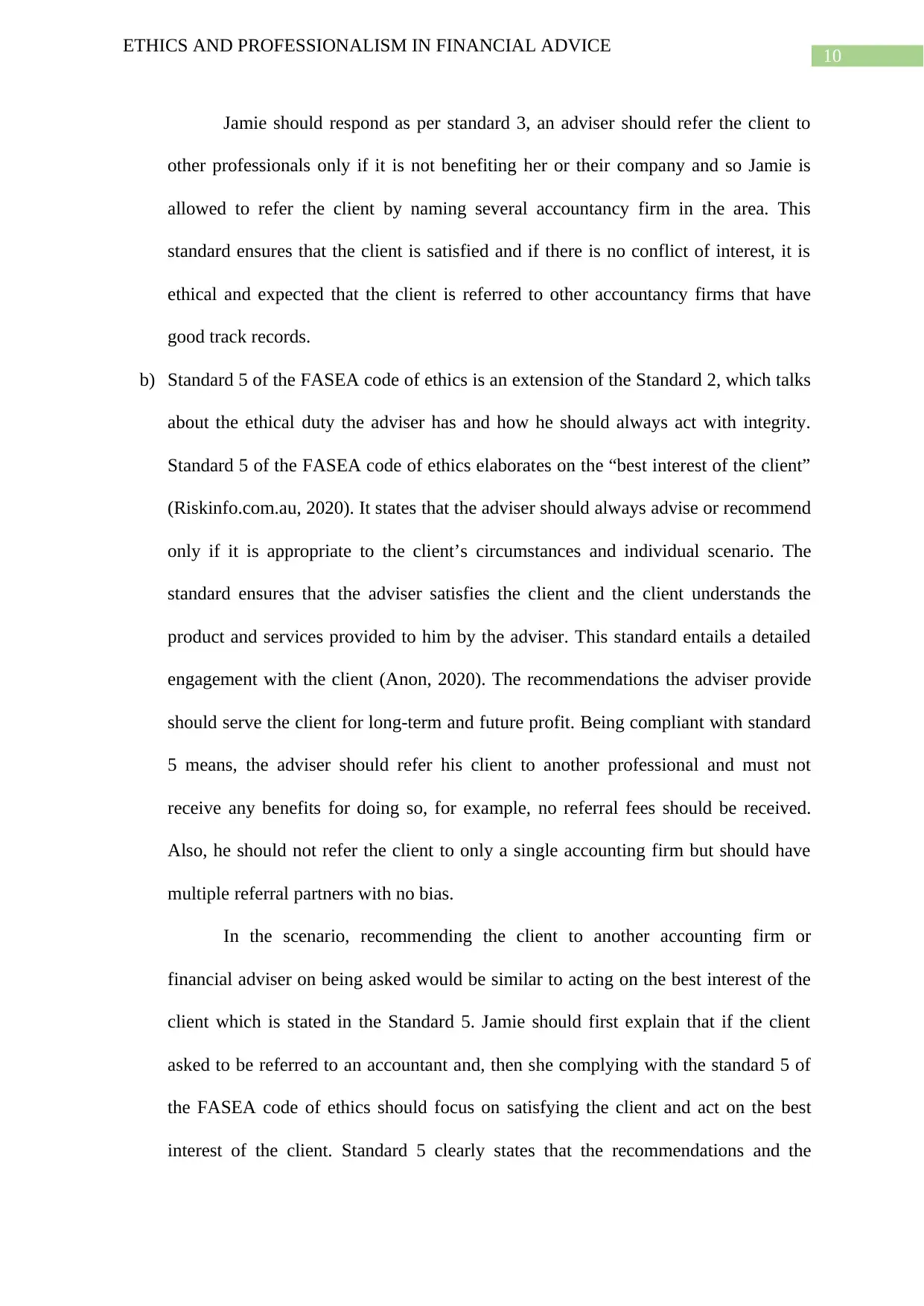
10
ETHICS AND PROFESSIONALISM IN FINANCIAL ADVICE
Jamie should respond as per standard 3, an adviser should refer the client to
other professionals only if it is not benefiting her or their company and so Jamie is
allowed to refer the client by naming several accountancy firm in the area. This
standard ensures that the client is satisfied and if there is no conflict of interest, it is
ethical and expected that the client is referred to other accountancy firms that have
good track records.
b) Standard 5 of the FASEA code of ethics is an extension of the Standard 2, which talks
about the ethical duty the adviser has and how he should always act with integrity.
Standard 5 of the FASEA code of ethics elaborates on the “best interest of the client”
(Riskinfo.com.au, 2020). It states that the adviser should always advise or recommend
only if it is appropriate to the client’s circumstances and individual scenario. The
standard ensures that the adviser satisfies the client and the client understands the
product and services provided to him by the adviser. This standard entails a detailed
engagement with the client (Anon, 2020). The recommendations the adviser provide
should serve the client for long-term and future profit. Being compliant with standard
5 means, the adviser should refer his client to another professional and must not
receive any benefits for doing so, for example, no referral fees should be received.
Also, he should not refer the client to only a single accounting firm but should have
multiple referral partners with no bias.
In the scenario, recommending the client to another accounting firm or
financial adviser on being asked would be similar to acting on the best interest of the
client which is stated in the Standard 5. Jamie should first explain that if the client
asked to be referred to an accountant and, then she complying with the standard 5 of
the FASEA code of ethics should focus on satisfying the client and act on the best
interest of the client. Standard 5 clearly states that the recommendations and the
ETHICS AND PROFESSIONALISM IN FINANCIAL ADVICE
Jamie should respond as per standard 3, an adviser should refer the client to
other professionals only if it is not benefiting her or their company and so Jamie is
allowed to refer the client by naming several accountancy firm in the area. This
standard ensures that the client is satisfied and if there is no conflict of interest, it is
ethical and expected that the client is referred to other accountancy firms that have
good track records.
b) Standard 5 of the FASEA code of ethics is an extension of the Standard 2, which talks
about the ethical duty the adviser has and how he should always act with integrity.
Standard 5 of the FASEA code of ethics elaborates on the “best interest of the client”
(Riskinfo.com.au, 2020). It states that the adviser should always advise or recommend
only if it is appropriate to the client’s circumstances and individual scenario. The
standard ensures that the adviser satisfies the client and the client understands the
product and services provided to him by the adviser. This standard entails a detailed
engagement with the client (Anon, 2020). The recommendations the adviser provide
should serve the client for long-term and future profit. Being compliant with standard
5 means, the adviser should refer his client to another professional and must not
receive any benefits for doing so, for example, no referral fees should be received.
Also, he should not refer the client to only a single accounting firm but should have
multiple referral partners with no bias.
In the scenario, recommending the client to another accounting firm or
financial adviser on being asked would be similar to acting on the best interest of the
client which is stated in the Standard 5. Jamie should first explain that if the client
asked to be referred to an accountant and, then she complying with the standard 5 of
the FASEA code of ethics should focus on satisfying the client and act on the best
interest of the client. Standard 5 clearly states that the recommendations and the
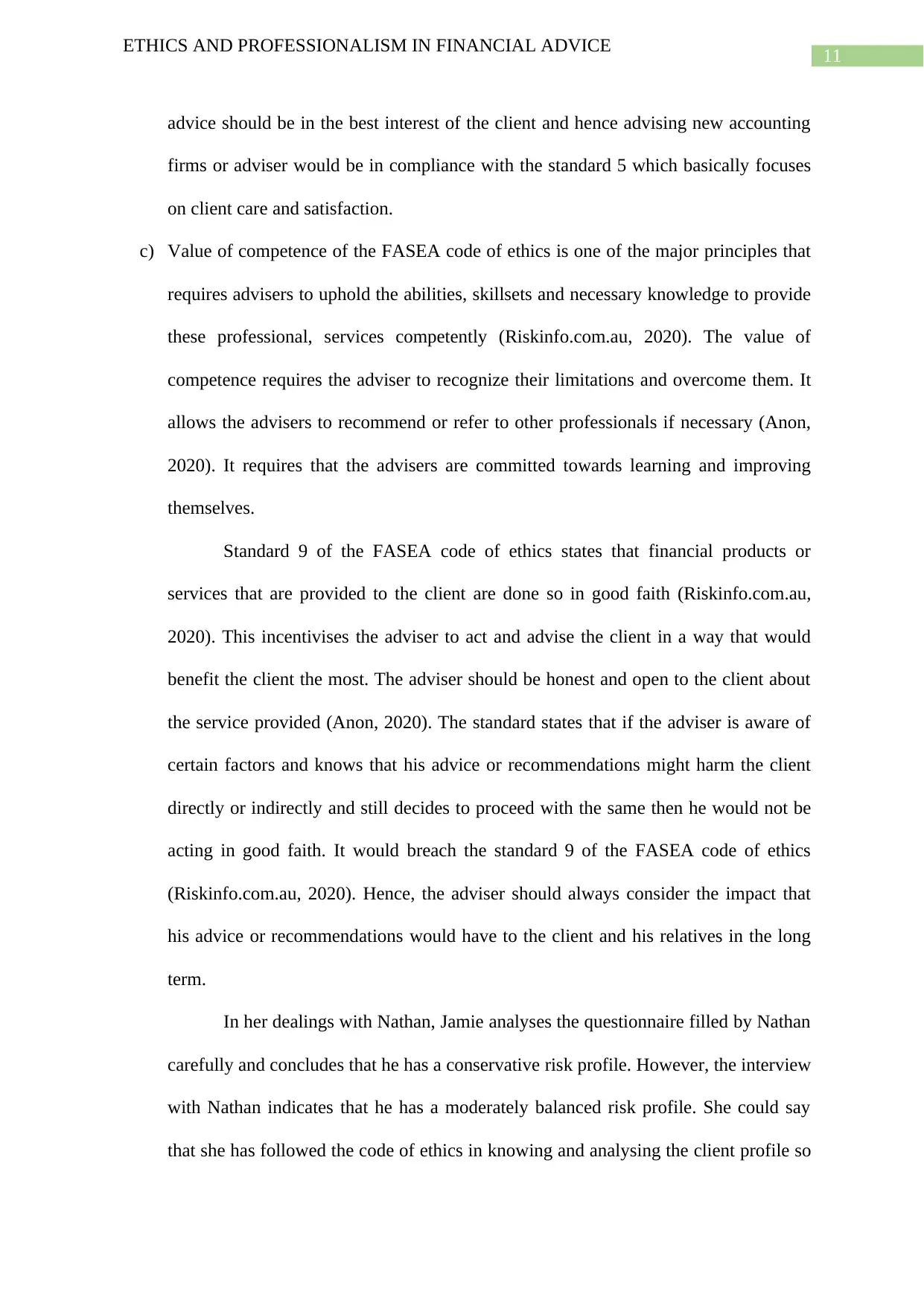
11
ETHICS AND PROFESSIONALISM IN FINANCIAL ADVICE
advice should be in the best interest of the client and hence advising new accounting
firms or adviser would be in compliance with the standard 5 which basically focuses
on client care and satisfaction.
c) Value of competence of the FASEA code of ethics is one of the major principles that
requires advisers to uphold the abilities, skillsets and necessary knowledge to provide
these professional, services competently (Riskinfo.com.au, 2020). The value of
competence requires the adviser to recognize their limitations and overcome them. It
allows the advisers to recommend or refer to other professionals if necessary (Anon,
2020). It requires that the advisers are committed towards learning and improving
themselves.
Standard 9 of the FASEA code of ethics states that financial products or
services that are provided to the client are done so in good faith (Riskinfo.com.au,
2020). This incentivises the adviser to act and advise the client in a way that would
benefit the client the most. The adviser should be honest and open to the client about
the service provided (Anon, 2020). The standard states that if the adviser is aware of
certain factors and knows that his advice or recommendations might harm the client
directly or indirectly and still decides to proceed with the same then he would not be
acting in good faith. It would breach the standard 9 of the FASEA code of ethics
(Riskinfo.com.au, 2020). Hence, the adviser should always consider the impact that
his advice or recommendations would have to the client and his relatives in the long
term.
In her dealings with Nathan, Jamie analyses the questionnaire filled by Nathan
carefully and concludes that he has a conservative risk profile. However, the interview
with Nathan indicates that he has a moderately balanced risk profile. She could say
that she has followed the code of ethics in knowing and analysing the client profile so
ETHICS AND PROFESSIONALISM IN FINANCIAL ADVICE
advice should be in the best interest of the client and hence advising new accounting
firms or adviser would be in compliance with the standard 5 which basically focuses
on client care and satisfaction.
c) Value of competence of the FASEA code of ethics is one of the major principles that
requires advisers to uphold the abilities, skillsets and necessary knowledge to provide
these professional, services competently (Riskinfo.com.au, 2020). The value of
competence requires the adviser to recognize their limitations and overcome them. It
allows the advisers to recommend or refer to other professionals if necessary (Anon,
2020). It requires that the advisers are committed towards learning and improving
themselves.
Standard 9 of the FASEA code of ethics states that financial products or
services that are provided to the client are done so in good faith (Riskinfo.com.au,
2020). This incentivises the adviser to act and advise the client in a way that would
benefit the client the most. The adviser should be honest and open to the client about
the service provided (Anon, 2020). The standard states that if the adviser is aware of
certain factors and knows that his advice or recommendations might harm the client
directly or indirectly and still decides to proceed with the same then he would not be
acting in good faith. It would breach the standard 9 of the FASEA code of ethics
(Riskinfo.com.au, 2020). Hence, the adviser should always consider the impact that
his advice or recommendations would have to the client and his relatives in the long
term.
In her dealings with Nathan, Jamie analyses the questionnaire filled by Nathan
carefully and concludes that he has a conservative risk profile. However, the interview
with Nathan indicates that he has a moderately balanced risk profile. She could say
that she has followed the code of ethics in knowing and analysing the client profile so
⊘ This is a preview!⊘
Do you want full access?
Subscribe today to unlock all pages.

Trusted by 1+ million students worldwide
1 out of 17
Related Documents
Your All-in-One AI-Powered Toolkit for Academic Success.
+13062052269
info@desklib.com
Available 24*7 on WhatsApp / Email
![[object Object]](/_next/static/media/star-bottom.7253800d.svg)
Unlock your academic potential
Copyright © 2020–2026 A2Z Services. All Rights Reserved. Developed and managed by ZUCOL.





